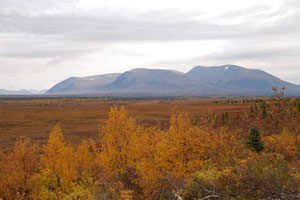Plaintiffs Disappointed in Pebble Mine Trial Decision
In a disappointing decision, Superior Court Judge Eric A. Aarseth ruled that the Alaska Constitution did not require the State to provide public notice or issue a best interest finding prior to allowing exploration and temporary water use activities at the Pebble Project, which have been ongoing for the last 23 years. He also ruled that wildlife in the area has not been impacted even though local subsistence and sport users testified that helicopter activity has driven caribou from the Pebble Project area, and that fuel spills in the area have not caused serious environmental impact or harm.
After two years of investigating and litigating the exploration and temporary water use permits for the Pebble Project, Trustees for Alaska, in a ten-day trial, introduced numerous witnesses and hundreds of exhibits demonstrating the harm to the resources in the region from Pebble’s exploration, including hundreds of boreholes, thousands of seismic explosions, dozens of test pits, and numerous fuel spills. The Department of Natural Resources (DNR) also allowed significant withdrawals of water from ponds and streams between 1988 and 2007 without requiring permits, and then without public notice, issued temporary water use permits which allowed pumping water from anadromous and resident fish streams without analysis of environmental impact.
In the decision, Judge Aarseth did not find these claims to be a constitutional violation. He held that the permits did not trigger any constitutional requirement for public notice or that the State conduct a best interest finding before it issued the permits. He also ruled that wildlife in the area has not been impacted even though local subsistence and sport users testified that helicopter activity has driven caribou from the Pebble Project area, and that fuel spills in the area have not caused serious environmental impact or harm.
One positive result of this lawsuit was that our investigation of the Pebble water use permits revealed that Pebble was using water from unpermitted sources in the exploration area and that the State had failed to investigate the hydrology or presence of fish in the water sources. During the briefing in the lawsuit, Trustees for Alaska brought to the State’s and the court’s attention that many of the drillholes at the Pebble Project sites were not near the water sources Pebble had designated. The result was a settlement regarding 45 water use violations where a penalty of $45,000 was assessed. A Water Management Plan was also developed and better fish screens were implemented to protect fish.
The People in the Bristol Bay region have for years wanted the chance to voice their concerns about Pebble to state regulators. They want a rational, science-based look at the totality of the impacts, including impacts at the exploration stage before – not after – damage has been done. And they want the ability to have input on whether the project moves forward at all. Though the decision is disappointing, we will continue to use the legal strategies available to protect the Bristol Bay watershed.
Pebble Mine Trial – Learn more about the 2014 Pebble Mine case



